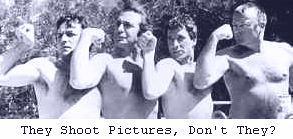The next film on our list is The Heiress, a 1949 drama starring Olivia de Haviland and Montgomery Clift.
Catherine is a painfully shy, self-conscious girl who is remarkable in really only two ways: her innocence and her wealth. Her father is continually disappointed in her, because he loved her mother so much and she died in childbirth. Now he feels that he gave up the love of his life for a girl who is average and unexceptional. For the most part, he is the reason why she is tentative and socially awkward...because he's been cutting her down and making disparaging comments all her life. He considers her unmarriageable, and has resigned himself to the fact that she's going to be with him until he dies.
Until Morris Townsend turns up in town. He's a devastatingly handsome young man who shows a keen interest in Catherine. It seems relatively obviously to everyone besides Catherine that he's only interested in her money, but she's flattered by the attention and thinks herself in love with Morris.
Well, Daddy blows a gasket. He's not going to leave her money just so that some fortune hunter can live off of her, and he threatens to cut her out of the will if she goes through with her plans to marry him. That's fine with Catherine, but when she tells Morris that she's only getting $10000 (money from her mother, which is the equivalent of $250000 today), he bails.
Years pass, her father dies, and she finds herself the hardened but financially independent mistress of her family home. Of course, now that she's free to marry who she chooses without losing her money, Morris comes a-calling again. Catherine is an older but wiser girl now, and she turns the tables on him. She agrees to marry him, but then spurns him at the last minute, just as he did to her years earlier.
Random Musings:
- Catherine decides to wear a beautiful red dress to please her father. His response? "But Catherine, your mother was fair...she dominated the color." Ouch.
- I find the relationship between Catherine and her father incredibly complex. He's got so much resentment and disappointment towards her, and he constantly disparages her, but at the same time he isn't an intentionally abusive father. In a way I guess he's trying to look out for her and her future...but he goes about it in the worst possible way EVER. I think it's fair to say that a lot of this depth comes from the wonderful performance by Ralph Richardson, who is (and I don't say this lightly) one of the most underrated actors of all time.
- I don't mean to be severe on any of my sex, but when Morris chasing after Catherine, I can't help but wonder, "Why?" I see Catherine as the kind of girl that you could fall in love once she felt comfortable around you, and you got to know her a little. She's not the kind of girl you fall in love with when you first meet her.
- Honestly, even though Morris is supposedly charming and perfect, there's something so weird about him. He really lays it on thick. And his relationship with Catherine is the most awkward thing I've ever seen in my life. She's so shy and standoffish, and he's the cockiest SOB in the world. I ain't sayin' he's a gold digger, but...well, you know the rest.
- If Lavinia was wealthy, I could see her and Morris as a good match. They've got great chemistry and I can just imagine them scheming together. He seems like the type to go for an older woman.
- I wonder what fatal diseases you can definitively diagnose by listening to your lungs through a stethoscope?
I really enjoyed this film. Its greatest strengths are the performances of the three leads: Ralph Richardson, Montgomery Clift, and Olivia de Haviland. I've heard tales that Richardson and Clift were a bit condescending to de Haviland on set, them being the "serious" actors and her comparatively untrained. If that's true (and I don't know if it is), I honestly think it benefited the film. If it had any impact on her downtrodden, self-conscious performance, then it was worth it. She's really great here, and her transformation to a stronger but less romantic woman is incredibly effective. The mirrored scenes where she climbs up the stairs, the first time weary and the second time triumphant, are wonderful. But it's hard to deny that Richardson steals the scene from every person he acts with. The writing is also top-notch, adapted from the popular play. It's full of style and great lines, and I love it.
Thanks for reading, and come back next time!












1 comments:
The director of the movie " Barbie" had Margot Robbie watch this film to observe Olivia DeHaviland's "transformation"
Post a Comment